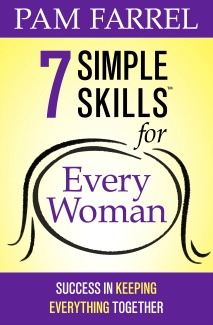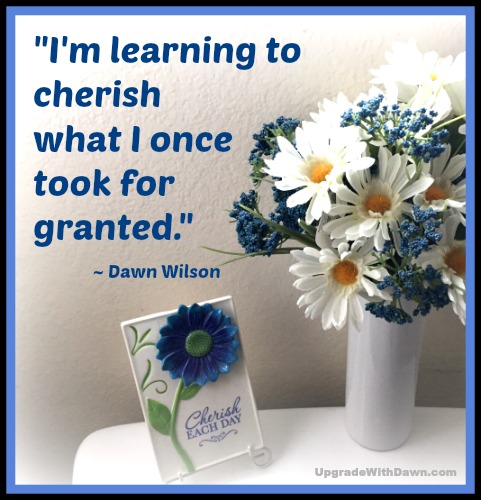Upgrade Your Destiny: The Obvious Choice
Pam Farrel is a woman with much life wisdom, and in this Spiritual Live UPGRADE, she reminds us to check our level of spiritual maturity and the choices we make.
The real complications in life come when our maturity does not match our challenges," Pam says. "Simplicity will come when our maturity surpasses our challenges."
I (Dawn) think we sometimes complicate our journey with God. We want more and more knowledge and opportunities, but we may be failing to obey the "first things"—the simple things God asks us to do, and the simple, unfettered way He wants us to live.
Pam continues . . .
God’s will lead us to maturity step by step, if we will simply follow His light and His leading through His Word.
My husband, Bill, and I consistently share a simple, obvious statement to gain success:
“We make our choices and our choices make us: Healthy choices gain a healthier life.”
Healthy decisions cause growth and improvement in our lives. With each passing year, we are faced with challenges, opportunities, and responsibilities that seemingly are bigger and more demanding than the year before.
Healthy decisions move us forward step by step so that each year we are better prepared for what comes our way.
In 7 Simple Skills for Every Woman: Success at Keeping It All Together, I share a series of tests we can use to check our choices and upgrade decision-making skills. Here is one of those tests.
Decision Making Skill 1: The Obvious Test
Ask yourself, “Is this decision so obvious that I am wasting time thinking about it?”
The reason these decisions are obvious is that God has already clearly spoken to these areas of life or they are generally accepted as the best practices.
Consider these obvious decisions based on the best practices in life:
- Get out of bed. Get dressed. Brush your teeth.
- If a police car pulls up behind you and turns its lights on, pull over.
- Get a good night’s sleep regularly.
- If someone does something nice, say, “Thank you.”
God wants to strengthen our life, beginning with the obvious.
We all want to gain God’s blessings, yet struggle to place ourselves under His “Umbrella of Blessing”—that is, choosing to live a life of integrity.
"He stores up sound wisdom for the upright; He is a shield to those who walk in integrity" (Proverbs 2:7).
Just as an umbrella shades us from harmful rays of the sun or protects us in the rain, even so, obedience to God’s stated will protect us—mostly from our own misguided choices.
God’s stated will is the foundation on which we all can build a stronger, more stable life.
We long to know God’s will, yet often many of us fail to obey the obvious verses where God clearly lays out the place to begin knowing His plan for our lives.
Here are a few verses that share God’s will for our lives.
Ask yourself, "Am I . . . "
. . . Saved?"
This is good, and pleases God our Savior, who wants all men to be saved and to come to a knowledge of the truth (1 Timothy 2:3-4).
. . . Spirit-filled?"
Do not get drunk on wine, which leads to debauchery. Instead, be filled with the Spirit (Ephesians 5:18).
. . . Sanctified?"
Therefore, I urge you, brothers, in view of God’s mercy, to offer your bodies as living sacrifices, holy and pleasing to God—this is your spiritual act of worship. Do not conform any longer to the pattern of this world, but be transformed by the renewing of your mind. Then you will be able to test and approve what God’s will is—his good, pleasing and perfect will (Romans 12:1-2).
. . . Sexually Pure?"
It is God’s will that you should be sanctified: that you should avoid sexual immorality (1 Thessalonians 4:3).
. . . Saying Thanks?"
Give thanks in all circumstances, for this is God’s will for you in Christ Jesus (1 Thessalonians 5:18).
. . . Suffering for Right?"
It is better, if it is God’s will, to suffer for doing good than for doing evil (1 Peter 3:17).
So then, those who suffer according to God’s will should commit themselves to their faithful Creator and continue to do good. (1 Peter 4:19).
. . . Seeking God?"
Blessed are they who keep his statutes and seek him with all their heart (Psalm 119:2).
I love those who love me, and those who seek me find me (Proverbs 8:17).
But if from there you seek the Lord your God, you will find him if you look for him with all your heart and with all your soul (Deuteronomy 4:29). *
Start doing—or continue walking out—these OBVIOUS things that God says are His will for you and three things will happen:
- Your heart will become more in tune to God’s heart,
- Your ability to understand the Bible will increase, and
- You will gain insights from God for your future.
Which is God asking you to upgrade by obeying?
For me, I keep Praise Pages in my Bullet Journal to help me keep an attitude of gratitude. This obvious habit helps me keep a positive mindset, and I make better, wiser decisions as a result.
By simply obeying God’s Word, you gain the ability to walk in God’s will.
Can you thank God today for all these “obvious” things? Take a moment to consider which one/s might need some fresh obedience in your journey with God today.
Pam Farrel is an international speaker, author of over 45 books including 7 Simple Skills for Every 
 Woman: Success In Keeping It All Together which looks at how to strengthen 7 core areas of a woman’s life to move it forward.(This article is adapted from the Simple Skills material) To gain more from Pam ‘s insights, join the Living Love-Wise Community. Simply go to www.Love-Wise.com and click the subscribe tab and select the membership option that best fits your life.
Woman: Success In Keeping It All Together which looks at how to strengthen 7 core areas of a woman’s life to move it forward.(This article is adapted from the Simple Skills material) To gain more from Pam ‘s insights, join the Living Love-Wise Community. Simply go to www.Love-Wise.com and click the subscribe tab and select the membership option that best fits your life.
Graphic adapted, courtesy of Delanie at Lightstock.
* The 7 "obvious" verses are from 10 Best Decisions a Woman Can Make (Harvest House, 1999), pp. 142-143.
 Post a Comment → Posted on
Post a Comment → Posted on  Tuesday, September 4, 2018 at 7:27AM
Tuesday, September 4, 2018 at 7:27AM  Choices,
Choices,  Decisions,
Decisions,  God's Will,
God's Will,  God's Word,
God's Word,  Obedience,
Obedience,  Obvious,
Obvious,  Pam Farrel,
Pam Farrel,  Simplicity,
Simplicity,  Upgrade with Dawn Upgrade Your Life
Upgrade with Dawn Upgrade Your Life  Biblical Thinking,
Biblical Thinking,  Spiritual Life
Spiritual Life 













